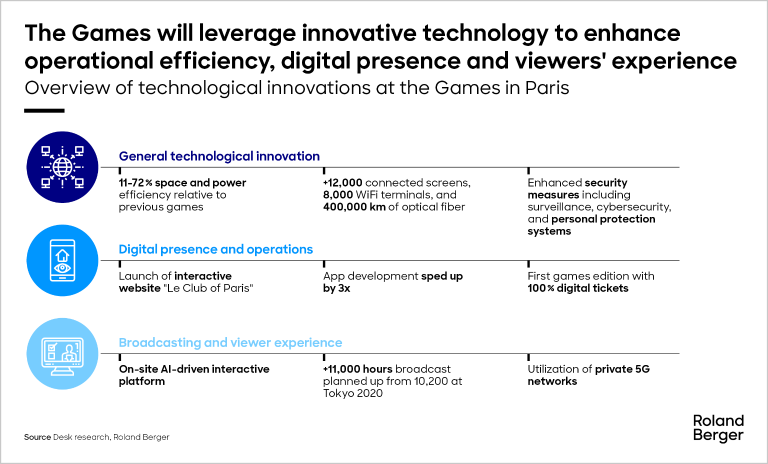Tailored solutions for sports sector growth.


The future of mega sports events
By Nicolas Teisseyre and Alia Sabala
What can event organizers learn from the many innovations on show at Paris this summer?
Imagine a premier sports event on the world stage where virtually all the facilities have simply been repurposed. Where there is no need for paper because everything is digital. Where gender parity is reality. Where food is sourced locally and plates are reused. And all that using less space, consuming less energy and at far lower overall cost than previous similar events. Well, somebody did imagine that – and went ahead and did it in Paris this summer.

"Do you want good PR or real transformation? Savvy event goers will quickly see through the former – they have a feel for what is authentic and what isn’t."
Drawing on its wealth of expertise in accompanying and advising major sporting events, Roland Berger has compiled an in-depth report detailing the factors behind Paris’ winning performance, examining the significance of this turning point for future events, and exploring the many opportunities that it opens up for event organizers who are bold enough to follow the French example.
Raising the bar on innovation
The Paris organizers have embraced innovation in an astonishing number of areas. Technology – from AI to 5G, from digital ticketing to electric transport for athletes and fans – obviously plays a key role. But this is not about technology for technology’s sake, nor about change to make a good impression: Sustainability, diversity and inclusion have been placed front and center, and so too has the viewer and fan experience – thanks to innovations around AI-driven interactive platforms and in-stadium WiFi, for example. In adopting this approach, Paris has literally changed the game of organizing world-class sporting events.
So, what comes after Paris?
While rightly highlighting many of the fascinating innovations on show in Paris this summer – including its sustainable infrastructure, footprint and catering strategy, but also its dedication to diversity, celebration of France’s rich culture and introduction of novel business concepts – the report focuses above all on what all this will mean for future events.
Four scenarios, rooted in in-depth discussions with sports industry experts and our own wealth of experience, identify two key axes along which the organization of large-scale sports events could develop going forward. One is the pace of change, where an organizer’s willingness to commit to transformational changes or its reluctance to “change a winning team” will largely determine whether the lessons learned in Paris go global or stay local. The other, equally important, we have termed “authenticity”: Will organizers jump on the sustainability bandwagon but introduce only cosmetic changes? That might make the company look good in the short term, but it will not genuinely deliver sustainable transformation – and certainly not good business results – in the long run. Or will they honestly “do the hard yards” and build on Paris’ transformational event to deliver future events that are good for business, good for the planet and, crucially, are honored by social media-savvy sports fans around the globe?
Change means challenges, but also opportunities
Our report acknowledges that some event organizers will likely fight shy of wholehearted transformation, possibly with one eye on the risks and the sheer effort it will involve. Yet it also takes a deep dive into four areas where short, medium and long-term opportunities are certainly attainable and make sound business sense:
- Sustainability is perhaps the most obvious source of opportunities that Paris has put on the radar. From low-emission zones around venues to the elimination of single-use plastics in the short term, and from green corridors between fan zones to zero-waste strategies in the longer term, mega sports events lend themselves to sustainable innovations that genuinely make a difference and will be welcomed by fans.
- Technology covers aspects from IoT wearables to monitor athletes’ health to smart, energy-optimized stadiums and virtual, augmented and mixed reality viewing experiences, alongside smart mobility.
- Diversity & inclusion, already showcased at the Paralympics, can and must filter down through every level of such events: recruiting staff from underprivileged backgrounds, ensuring gender parity even among referees and judges, and harnessing machine learning and AI to drive more objective (unbiased) decision-making both on and off the field.
- Business concerns naturally dovetail with all of the above, with the aim of making transformation pay for itself and deliver healthy and lasting profits. Here again, there is no shortage of opportunities, from the humble bike station to personalized virtual advertising to the integration of sports events in a wider virtual economy.
Innovation is for winners!
If Paris is the measure of things to come, the mega sporting events of tomorrow will be unrecognizable compared to what we know today. And, since all the four fields of opportunity described above play into each other, the report arrives at an unequivocal conclusion: The industry leaders of tomorrow will be those that “walk the talk” of sustainable innovation – in the interests of fans and stakeholders, profits and the planet.
Register now to access the full study, to learn more about the innovations and benefits of organizing global sporting events.



_image_caption_none.png?v=1066026)

_tile_teaser_w425x260.jpg?v=874833)


